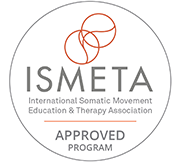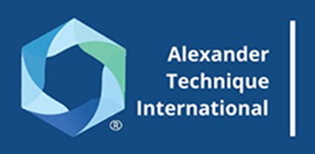It is always our intention to teach our classes with the care and kindness necessary to create a safe environment. Some of our faculty are specifically trained in The Actor’s Secret training, which combines the somatic experiencing work of Peter Levine and the breath work of Carl Stough with the work of F.M. Alexander. This three-year training is taught by Betsy Polatin, who has worked closely with Peter Levine and others in the trauma-related disciplines. The undercurrent of Boston Conservatory’s Alexander Technique teacher-training program is supported by this important work. It can help trainees to feel safe during their training and informs them of ways to handle trauma in their Alexander Technique teaching. AT Training Core (I, II, III)
Activities in the primary class are the same for all three years, though the emphasis and expectations are different for each year of training. Students are not separated by training year. This allows for the same material to be revisited with new perspective and understanding each year. Trainees learn the procedures of table work (working with students on a bodywork table), chair work (guiding a student to sitting and standing from a chair), and activity work (helping students with various activities, e.g. playing a musical instrument). Body mapping (studying basic anatomy from a personal and experiential perspective) is studied each year. Alexander Technique procedures such as whispered ah or hands on the back of the chair are explored each year.
Hybrid Training
Over recent years, we have learned that training on Zoom is a worthwhile option. While the training course does accept students who are out of town, they are required to visit the training in person twice per semester. Please contact the program director to discuss which option will work best for you. In accordance with our ISMETA-approved training requirements, the hybrid training online component does not include more than 19 percent of the training online.
AT Training Core I
Trainees learn about their own use and how this affects their contact with their students. Learning to receive information via hands-on contact is an important first step to working with and directing students. By the end of the first year, it is expected that trainees can make hands-on contact with students without compromising their own use. First-year students are expected to give an “entrance report” describing their goals and expectations for this work. They provide some details about what led them to train. Becoming aware of their use while speaking is an important part of training.
AT Training Core II
Trainees learn how to guide students into movement. They combine their kinesthetic listening skills with a more directed approach to guiding students into movement. By the end of the second year, trainees can guide students in various activities without compromising their own use. They are beginning to use more language in conjunction with their hands-on teaching. Self awareness while speaking to a group becomes more natural to second-year trainees.
AT Training Core III
Trainees combine language and hands-on instruction equally. They become the teachers of the group. Their ability to teach to the group and articulate their intentions should be clear and comfortable. Third-year students are expected to give an “exit report” describing their perspective on their goals, achievements, and expectations. By the third year, the activity of public speaking will be quite comfortable.
AT Reading
Trainees will read all four books written by F.M. Alexander as well as seven books written about the technique written by others. A list of books will be given to trainees in the first semester. The sequence listed below is subject to change.
AT Reading I a
Freedom to Change, Frank Pierce Jones
One book not written by F.M. Alexander (chosen from a book list)
AT Reading I b
The Use of the Self, F.M. Alexander
One book not written by F.M. Alexander (chosen from a book list)
AT Reading II a
The Universal Constant in Living, F.M. Alexander
“What Is the Mechanism” and “Experimental Studies” from Freedom to Change, F.P. Jones
One book not written by F.M. Alexander (chosen from a book list)
AT Reading II b
The Bedford Lecture
Tinbergen Speech
Dunster Lecture
Barlow Memorial Lecture 1965
One book not written by F.M. Alexander (chosen from a book list)
AT Reading III a
Constructive Conscious Control of the Individual, F.M. Alexander
“Notes on Teaching” from Freedom To Change, F.P. Jones
One book not written by F.M. Alexander (chosen from a book list)
AT Reading III b
Man’s Supreme Inheritance, F.M. Alexander
One book not written by F.M. Alexander (chosen from a book list)



